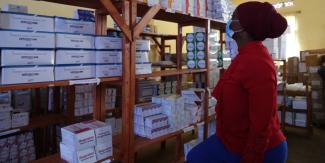Pharmacy managers play an essential, but often overlooked role in health care. We rely on them to ensure the health products available, safe and accessible. They are typically also responsible for managing staff, monitoring inventory levels, ensuring compliance with regulation and providing the best possible patient care. To be successful in their role, pharmacy managers must have strong leadership and communication skills, attention to detail, and a deep understanding of the healthcare industry, on top of their technical expertise.
Noura Itunge started her career in health care as a nurse in Mwaro province in Burundi. “I was responsible for receiving patients and providing them with the help they needed,” she recalls. After a while, Noura was appointed as associate pharmacy manager at Fota Health District. To gain a better understanding of her new role, she relied on colleagues and their expertise.
Very soon, she noticed serious issues that negatively affected the care her team could provide to the patients. “The requisition process of antiretrovirals for HIV patients was a real challenge for me. I was not able to correctly estimate the needs of our pharmacy, so often a patient would come asking for medicine, but we would simply be all out,” Noura explains.
Stockouts are a serious issue, especially for patients who depend on the regular provision of medication to maintain control of their health condition. Noura was one of many health workers who were noticing issues in the pharmaceutical supply chain that could only be addressed through a targeted, data-driven and systemic approach, delivering tools and skills to the front-line health workers.
USAID/Burundi offered an impactful solution through a program that delivers lasting results. The Global Health Supply Chain – Procurement and Supply Management (GHSC-PSM) activity works in close partnership with the Burundi Drug and Food Regulatory Authority (ABREMA) and other stakeholders to train health workers and help them effectively use technology to manage health product supply chain, track inventory and prepare reports, all while staying compliant with the management guidelines at all levels.
Noura took advantage of the program and saw first-hand the positive change. By adequately using data to plan and manage health products, her team was able to monitor the inventory transparently, share logistics information for decision-making, and ensure that patients received the medicine they needed. “Thanks to the coaching and supervisory visits led by ABREMA in collaboration with the [USAID-funded] GHSC-PSM, I can estimate our needs considering the quantities in our stock and the consumption of products in health facilities of our entire district”, Noura explains.
It was a game-changer on many levels. Today, Noura and her team can deliver consistent quality care for their community. Their organizational and problem-solving skills are now stronger, and they can quickly adapt to new challenges as they arise.
This program has opened new doors for Noura, who is now motivated to keep learning and growing. “I plan to take training courses on logistics management and information systems,” she says with confidence.

